Comparative Analysis: Truth, Identity, Oedipus, Plato, and Descartes
VerifiedAdded on 2022/09/15
|5
|1043
|19
Essay
AI Summary
This essay delves into the profound themes of truth and identity as explored in Shakespeare's Hamlet and the play Oedipus. The analysis examines how the protagonists in these plays grapple with their identities and the quest for truth, highlighting the Oedipus complex in Hamlet. Furthermore, the essay draws insightful comparisons between Plato's Allegory of the Cave and Descartes' Meditations on the First Philosophy, exploring their differing perspectives on reality, knowledge, and the human condition. The essay provides a comprehensive overview of these philosophical concepts, supported by relevant references, offering a deeper understanding of these literary and philosophical works.
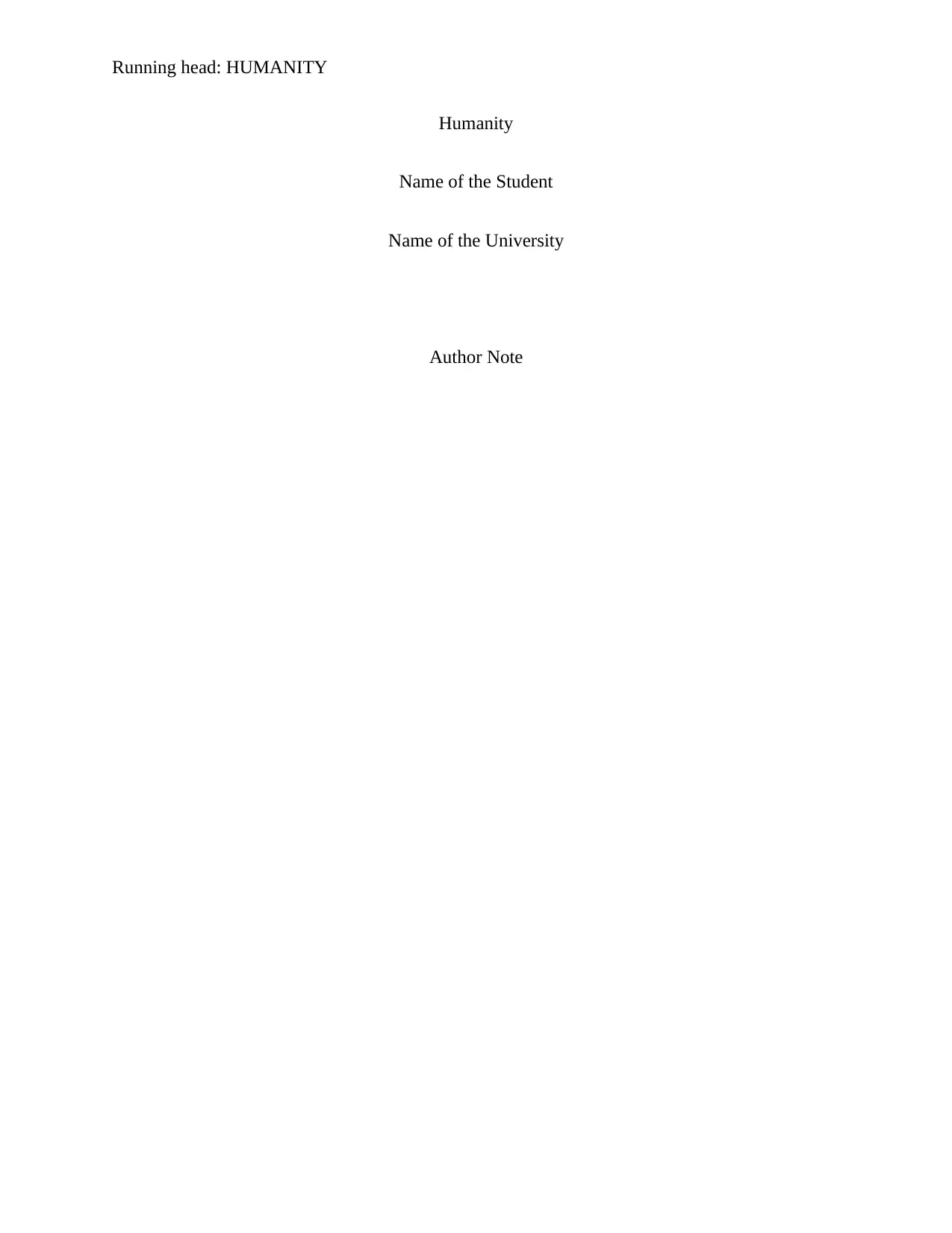
Running head: HUMANITY
Humanity
Name of the Student
Name of the University
Author Note
Humanity
Name of the Student
Name of the University
Author Note
Paraphrase This Document
Need a fresh take? Get an instant paraphrase of this document with our AI Paraphraser
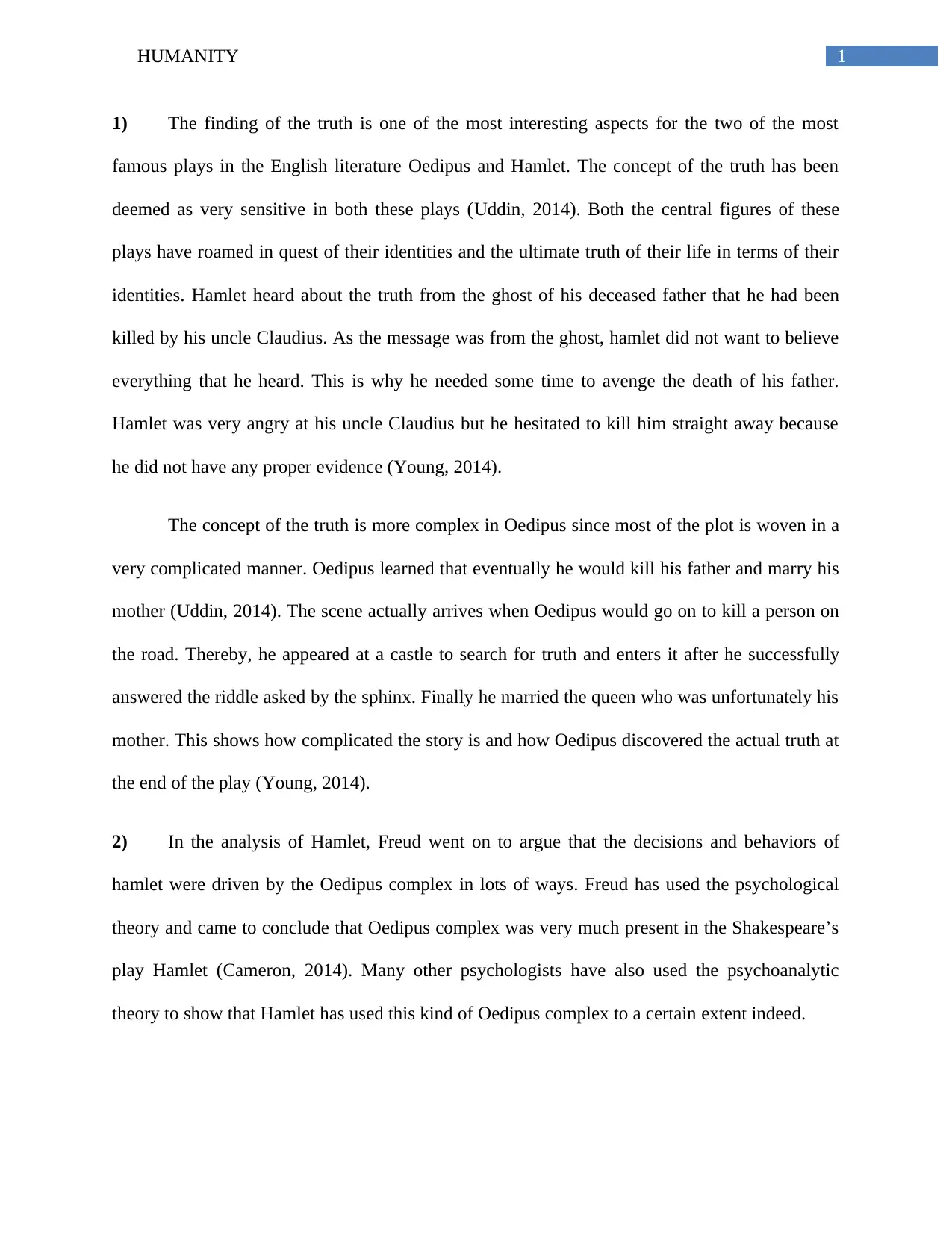
1HUMANITY
1) The finding of the truth is one of the most interesting aspects for the two of the most
famous plays in the English literature Oedipus and Hamlet. The concept of the truth has been
deemed as very sensitive in both these plays (Uddin, 2014). Both the central figures of these
plays have roamed in quest of their identities and the ultimate truth of their life in terms of their
identities. Hamlet heard about the truth from the ghost of his deceased father that he had been
killed by his uncle Claudius. As the message was from the ghost, hamlet did not want to believe
everything that he heard. This is why he needed some time to avenge the death of his father.
Hamlet was very angry at his uncle Claudius but he hesitated to kill him straight away because
he did not have any proper evidence (Young, 2014).
The concept of the truth is more complex in Oedipus since most of the plot is woven in a
very complicated manner. Oedipus learned that eventually he would kill his father and marry his
mother (Uddin, 2014). The scene actually arrives when Oedipus would go on to kill a person on
the road. Thereby, he appeared at a castle to search for truth and enters it after he successfully
answered the riddle asked by the sphinx. Finally he married the queen who was unfortunately his
mother. This shows how complicated the story is and how Oedipus discovered the actual truth at
the end of the play (Young, 2014).
2) In the analysis of Hamlet, Freud went on to argue that the decisions and behaviors of
hamlet were driven by the Oedipus complex in lots of ways. Freud has used the psychological
theory and came to conclude that Oedipus complex was very much present in the Shakespeare’s
play Hamlet (Cameron, 2014). Many other psychologists have also used the psychoanalytic
theory to show that Hamlet has used this kind of Oedipus complex to a certain extent indeed.
1) The finding of the truth is one of the most interesting aspects for the two of the most
famous plays in the English literature Oedipus and Hamlet. The concept of the truth has been
deemed as very sensitive in both these plays (Uddin, 2014). Both the central figures of these
plays have roamed in quest of their identities and the ultimate truth of their life in terms of their
identities. Hamlet heard about the truth from the ghost of his deceased father that he had been
killed by his uncle Claudius. As the message was from the ghost, hamlet did not want to believe
everything that he heard. This is why he needed some time to avenge the death of his father.
Hamlet was very angry at his uncle Claudius but he hesitated to kill him straight away because
he did not have any proper evidence (Young, 2014).
The concept of the truth is more complex in Oedipus since most of the plot is woven in a
very complicated manner. Oedipus learned that eventually he would kill his father and marry his
mother (Uddin, 2014). The scene actually arrives when Oedipus would go on to kill a person on
the road. Thereby, he appeared at a castle to search for truth and enters it after he successfully
answered the riddle asked by the sphinx. Finally he married the queen who was unfortunately his
mother. This shows how complicated the story is and how Oedipus discovered the actual truth at
the end of the play (Young, 2014).
2) In the analysis of Hamlet, Freud went on to argue that the decisions and behaviors of
hamlet were driven by the Oedipus complex in lots of ways. Freud has used the psychological
theory and came to conclude that Oedipus complex was very much present in the Shakespeare’s
play Hamlet (Cameron, 2014). Many other psychologists have also used the psychoanalytic
theory to show that Hamlet has used this kind of Oedipus complex to a certain extent indeed.
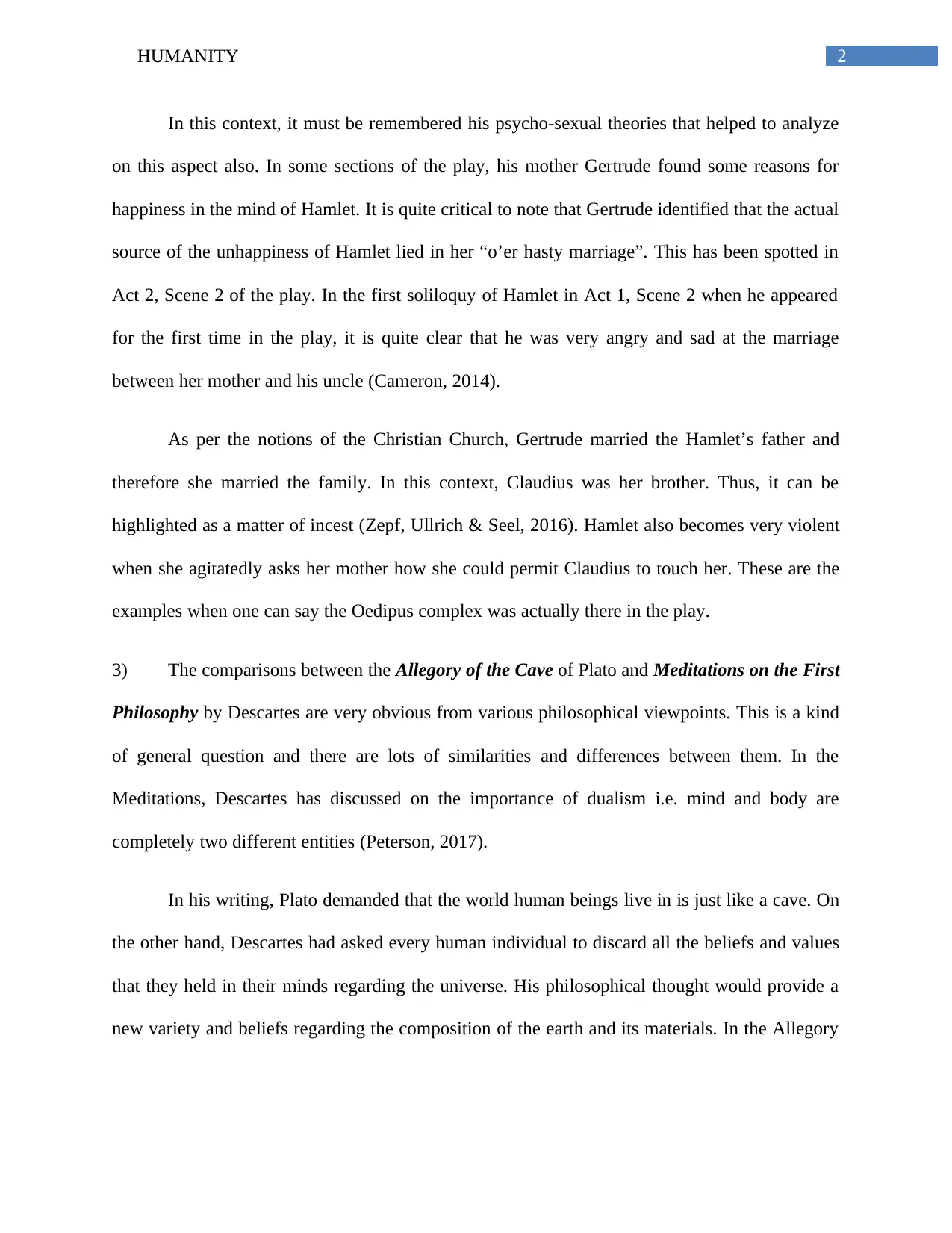
2HUMANITY
In this context, it must be remembered his psycho-sexual theories that helped to analyze
on this aspect also. In some sections of the play, his mother Gertrude found some reasons for
happiness in the mind of Hamlet. It is quite critical to note that Gertrude identified that the actual
source of the unhappiness of Hamlet lied in her “o’er hasty marriage”. This has been spotted in
Act 2, Scene 2 of the play. In the first soliloquy of Hamlet in Act 1, Scene 2 when he appeared
for the first time in the play, it is quite clear that he was very angry and sad at the marriage
between her mother and his uncle (Cameron, 2014).
As per the notions of the Christian Church, Gertrude married the Hamlet’s father and
therefore she married the family. In this context, Claudius was her brother. Thus, it can be
highlighted as a matter of incest (Zepf, Ullrich & Seel, 2016). Hamlet also becomes very violent
when she agitatedly asks her mother how she could permit Claudius to touch her. These are the
examples when one can say the Oedipus complex was actually there in the play.
3) The comparisons between the Allegory of the Cave of Plato and Meditations on the First
Philosophy by Descartes are very obvious from various philosophical viewpoints. This is a kind
of general question and there are lots of similarities and differences between them. In the
Meditations, Descartes has discussed on the importance of dualism i.e. mind and body are
completely two different entities (Peterson, 2017).
In his writing, Plato demanded that the world human beings live in is just like a cave. On
the other hand, Descartes had asked every human individual to discard all the beliefs and values
that they held in their minds regarding the universe. His philosophical thought would provide a
new variety and beliefs regarding the composition of the earth and its materials. In the Allegory
In this context, it must be remembered his psycho-sexual theories that helped to analyze
on this aspect also. In some sections of the play, his mother Gertrude found some reasons for
happiness in the mind of Hamlet. It is quite critical to note that Gertrude identified that the actual
source of the unhappiness of Hamlet lied in her “o’er hasty marriage”. This has been spotted in
Act 2, Scene 2 of the play. In the first soliloquy of Hamlet in Act 1, Scene 2 when he appeared
for the first time in the play, it is quite clear that he was very angry and sad at the marriage
between her mother and his uncle (Cameron, 2014).
As per the notions of the Christian Church, Gertrude married the Hamlet’s father and
therefore she married the family. In this context, Claudius was her brother. Thus, it can be
highlighted as a matter of incest (Zepf, Ullrich & Seel, 2016). Hamlet also becomes very violent
when she agitatedly asks her mother how she could permit Claudius to touch her. These are the
examples when one can say the Oedipus complex was actually there in the play.
3) The comparisons between the Allegory of the Cave of Plato and Meditations on the First
Philosophy by Descartes are very obvious from various philosophical viewpoints. This is a kind
of general question and there are lots of similarities and differences between them. In the
Meditations, Descartes has discussed on the importance of dualism i.e. mind and body are
completely two different entities (Peterson, 2017).
In his writing, Plato demanded that the world human beings live in is just like a cave. On
the other hand, Descartes had asked every human individual to discard all the beliefs and values
that they held in their minds regarding the universe. His philosophical thought would provide a
new variety and beliefs regarding the composition of the earth and its materials. In the Allegory
⊘ This is a preview!⊘
Do you want full access?
Subscribe today to unlock all pages.

Trusted by 1+ million students worldwide
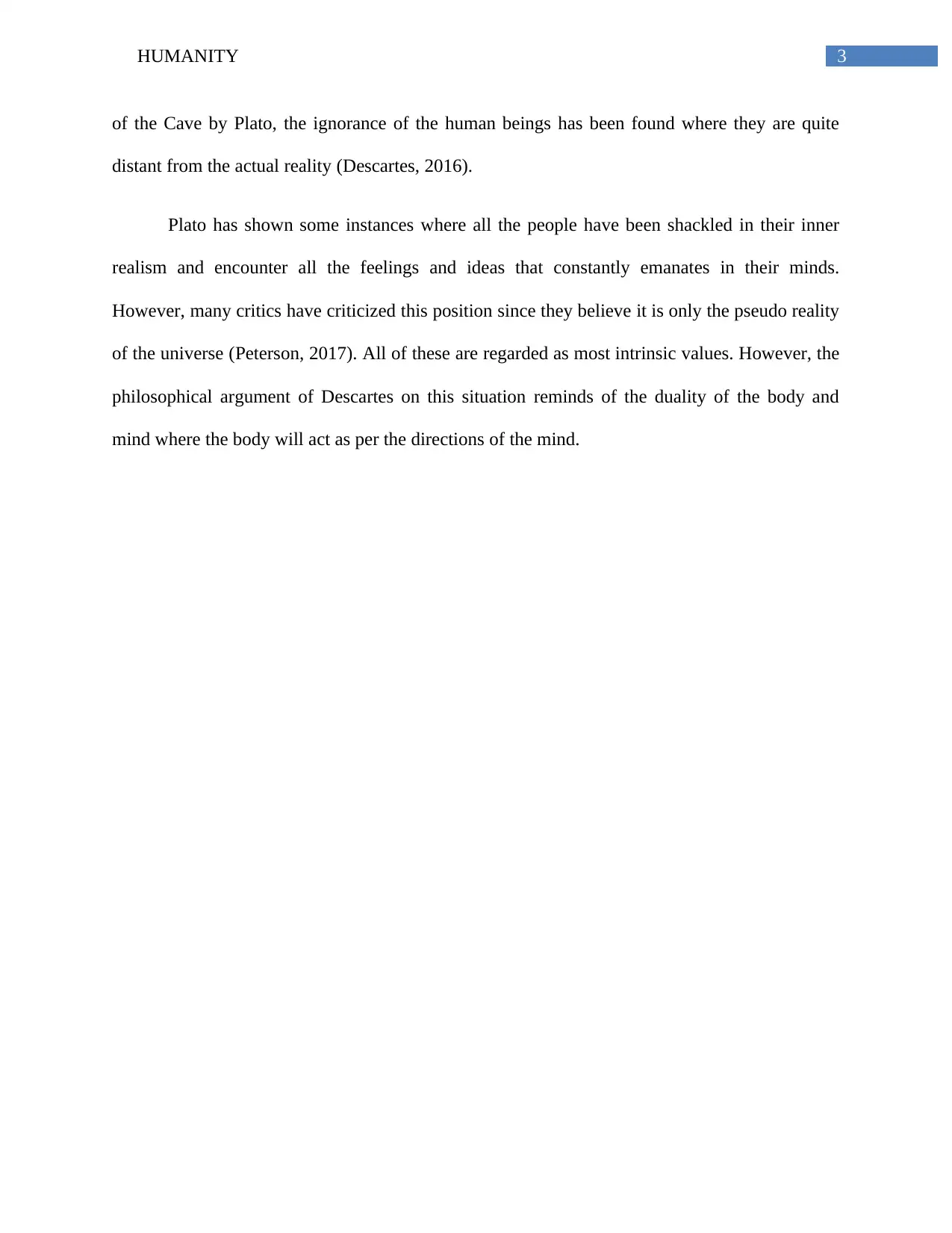
3HUMANITY
of the Cave by Plato, the ignorance of the human beings has been found where they are quite
distant from the actual reality (Descartes, 2016).
Plato has shown some instances where all the people have been shackled in their inner
realism and encounter all the feelings and ideas that constantly emanates in their minds.
However, many critics have criticized this position since they believe it is only the pseudo reality
of the universe (Peterson, 2017). All of these are regarded as most intrinsic values. However, the
philosophical argument of Descartes on this situation reminds of the duality of the body and
mind where the body will act as per the directions of the mind.
of the Cave by Plato, the ignorance of the human beings has been found where they are quite
distant from the actual reality (Descartes, 2016).
Plato has shown some instances where all the people have been shackled in their inner
realism and encounter all the feelings and ideas that constantly emanates in their minds.
However, many critics have criticized this position since they believe it is only the pseudo reality
of the universe (Peterson, 2017). All of these are regarded as most intrinsic values. However, the
philosophical argument of Descartes on this situation reminds of the duality of the body and
mind where the body will act as per the directions of the mind.
Paraphrase This Document
Need a fresh take? Get an instant paraphrase of this document with our AI Paraphraser
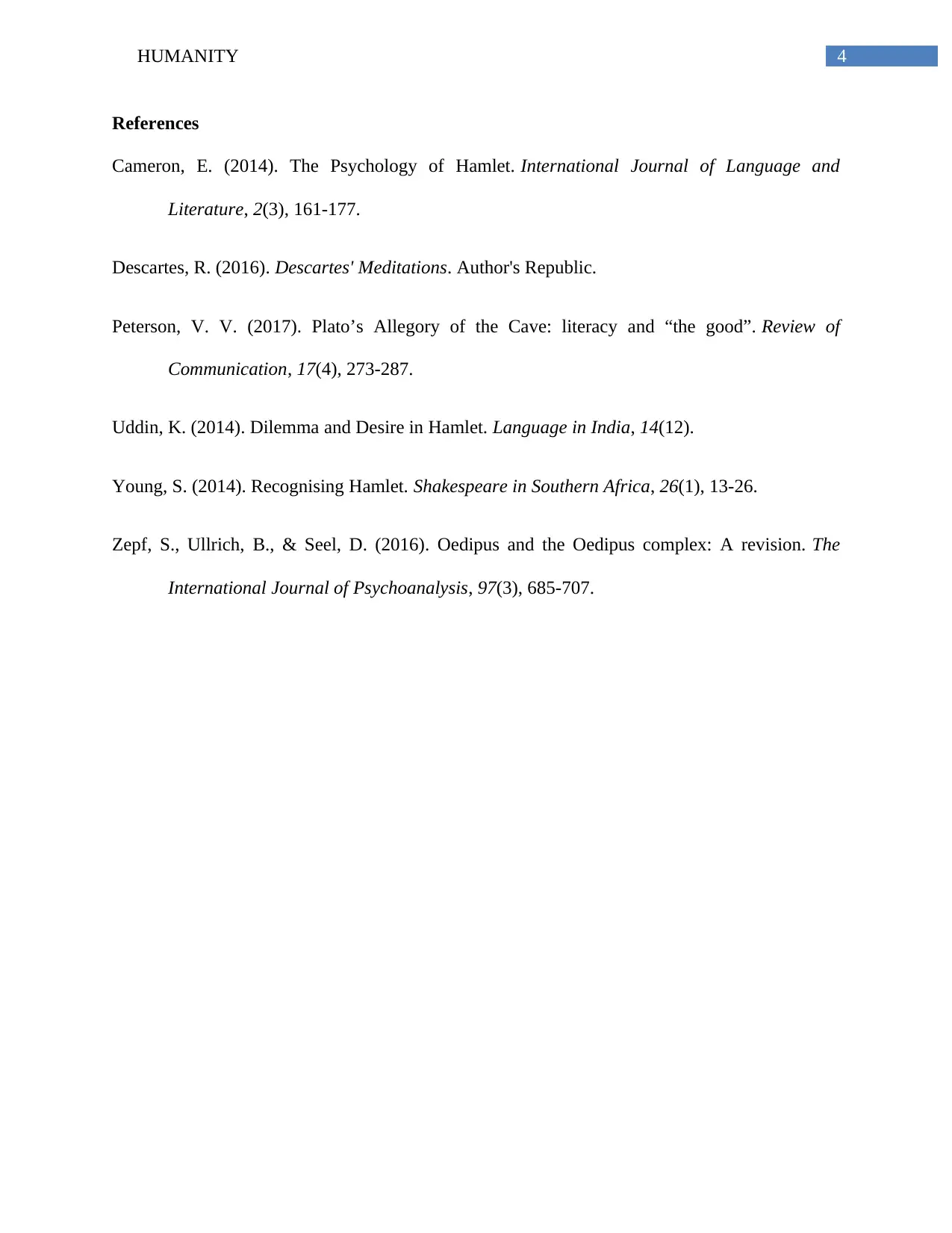
4HUMANITY
References
Cameron, E. (2014). The Psychology of Hamlet. International Journal of Language and
Literature, 2(3), 161-177.
Descartes, R. (2016). Descartes' Meditations. Author's Republic.
Peterson, V. V. (2017). Plato’s Allegory of the Cave: literacy and “the good”. Review of
Communication, 17(4), 273-287.
Uddin, K. (2014). Dilemma and Desire in Hamlet. Language in India, 14(12).
Young, S. (2014). Recognising Hamlet. Shakespeare in Southern Africa, 26(1), 13-26.
Zepf, S., Ullrich, B., & Seel, D. (2016). Oedipus and the Oedipus complex: A revision. The
International Journal of Psychoanalysis, 97(3), 685-707.
References
Cameron, E. (2014). The Psychology of Hamlet. International Journal of Language and
Literature, 2(3), 161-177.
Descartes, R. (2016). Descartes' Meditations. Author's Republic.
Peterson, V. V. (2017). Plato’s Allegory of the Cave: literacy and “the good”. Review of
Communication, 17(4), 273-287.
Uddin, K. (2014). Dilemma and Desire in Hamlet. Language in India, 14(12).
Young, S. (2014). Recognising Hamlet. Shakespeare in Southern Africa, 26(1), 13-26.
Zepf, S., Ullrich, B., & Seel, D. (2016). Oedipus and the Oedipus complex: A revision. The
International Journal of Psychoanalysis, 97(3), 685-707.
1 out of 5
Related Documents
Your All-in-One AI-Powered Toolkit for Academic Success.
+13062052269
info@desklib.com
Available 24*7 on WhatsApp / Email
![[object Object]](/_next/static/media/star-bottom.7253800d.svg)
Unlock your academic potential
Copyright © 2020–2025 A2Z Services. All Rights Reserved. Developed and managed by ZUCOL.





